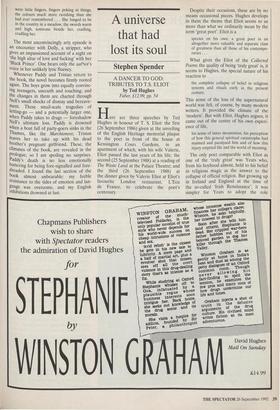A universe that had lost its soul
Stephen Spender
A DANCER TO GOD: TRIBUTES TO T.S. ELIOT by Ted Hughes Faber, f12.99, pp. 54 Here are three speeches by Ted Hughes in honour of T. S. Eliot: the first (26 September 1986) given at the unveiling of the English Heritage memorial plaque to the poet in front of the house at Kensington Court. Gardens, in an apartment of which, with his wife Valerie, Eliot passed the last years of his life; the second (25 September 1988) at a reading of The Waste Land at the Palace Theatre; and the third (26 September 1988) at the dinner given by Valerie Eliot at Eliot's favourite London restaurant, L'Ecu de France, to celebrate the poet's centenary. Despite their occasions, these are by no means occasional pieces. Hughes develops in them the theme that Eliot seems to us more than what we ordinarily mean by the term 'great poet'. Eliot is a
species on his own, a great poet in an altogether more valuable and separate class of greatness than all those of his contempo- raries ...
What gives the Eliot of the Collected Poems the quality of being 'truly great' is, it seems to Hughes, the special nature of his reaction to the complete collapse of belief in religious systems and rituals early in the present century.
This sense of the loss of the supernatural world was felt, of course, by many modern writers. It provided the climate of the `modern'. But with Eliot, Hughes argues, it came out of the centre of his own experi- ence of life, his sense of inner devastation, his perception of how this general spiritual catastrophe had maimed and paralysed him and of how this injury emptied life and the world of meaning.
The only poet comparable with Eliot as one of the 'truly great' was Yeats who, from his boyhood almost, held to his belief in religious magic as the answer to the collapse of official religion. But growing up in Ireland and England at the time of the so-called 'Irish Renaissance', it was simpler for Yeats to adopt the role of 'shaman' at a time of spiritual crisis for his 'tribe' than for Eliot, coming to Europe from New England, to do so. Moreover, Yeats's beliefs and actions remained confined to the Irish and Anglo-Irish, whereas
Eliot moves at large throughout all variations of language and culture.
Hughes, comparing Eliot with Yeats thinks that 'Eliot, too, looks not a little shamanic'. The Waste Lane culminates with the mysterious
Datta Dayadhvam Damyata
— 'Give, sympathise, control.' The resurrection of the god is implicit in his death. But the task of Eliot in overcoming despair and becoming aware of his calling was much more difficult than that which had confronted Yeats.
He lacked any formal or — as Yeats would have put it — magical defence. He survived and went forward on pure, naked character . . . His tribe, perhaps, included all Western man, or, perhaps, even, simply spiritual man. His homeland, in this sense, was that `infinitely gentle, infinitely suffering' thing's hold on the nature of reality, and on the nature of consciousness, in a universe that had, in primitive fashion, lost its soul.
In the third of these pieces, Hughes examines two early poems which fore- shadow Tiresias in The Waste Land in creating figures that provide metaphors for the poet's own consciousness in his poetry. These are the strange and haunting 'The Death of Saint Narcissus' and `Humouresque' (after Laforgue), lament for a dead marionette. Here we already have the Prufrockian theme of the poet, aware of the surrounding breakdown of religious values, being forced to assume a seemingly artificial persona which Eliot — or should I say the poetry? — from behind the scenes as it were — views ironicallY. The opening line of 'The Death of Saint Narcissus' strikes the most haunting note of The Waste Land:
Come under the shadow of this gray rock.
The poem ironically fuses a kind of nar- cissistic solipsism with a tragic awareness of the self:
Struck down by such knowledge He could not live men's ways, but became a dancer before God.
Strangely, Saint Narcissus transmutes to Saint Sebastian:
Because his flesh was in love with the burning arrows.
In these three pieces we encounter at its best the special characteristics of Ted Hughes as critic. He can be a close inter- i pretor of texts, but his real obsession s
with the nature of poetic genius, 'the truly great'. In these short pieces we see corn- pressed the qualities which make his Shakespeare and the Goddess of Complete Being a work of genius about the nature of poetic genius.



































































 Previous page
Previous page